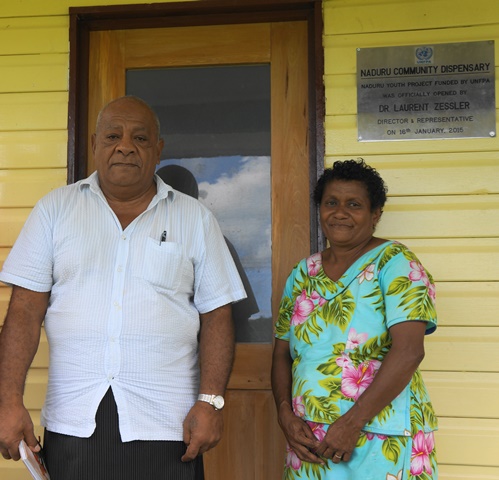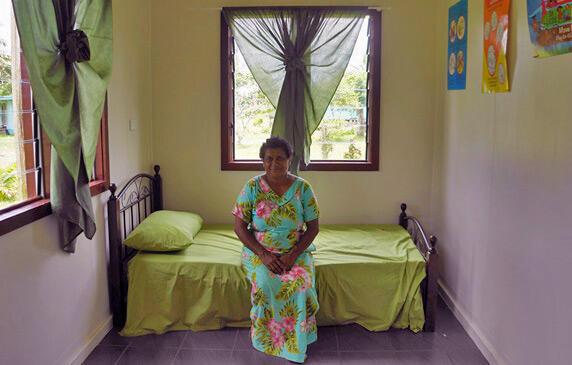THE propensity to hold off going to seek medical advice or not to take oneself to the dentist until one's face resembled a puffer fish is a practice in our island communities we know too well. There are various reasons we do this and for some, the reality of the costs involved often makes herbal medication the first stop.
For villagers of Naduru in Kuku, Tailevu, this habitual nonchalance was something that occurred often even for its traditional leader, Tui Kuku and Vunivalu (Naduru) Ratu Manasa Kalounivutia to approach the subdivisional hospital staff to ask why were there so many and to him, untimely, deaths.
The response that it was because of the tendency to stay home with one's illness until it was too late was unexpected, but perhaps no surprise as he himself had to ferry six people to hospital since accepting his traditional position some three years ago.
The discussion also drove home the need to revamp the village dispensary. The structure that housed a dispensary once had practically fallen in, forcing nurses' public health teams on their monthly community visits to use a classroom of the village school or the community hall.
In a village meeting in 2014, Ratu Manasa who had by then registered the Naduru women and youth groups which he recognised as platforms he would use for development work, informed the youth group their project was to see to the revamp of the village dispensary.
A month later, the New York-based (United States of America) executive board of the United Nations Development Program (UNDP), United Nations Population Fund (UNFPA) and the United Nations Office for Project Services (UNOPS) which was chaired by Fiji at the time, visited the village.
"We decided to take advantage of that opportunity and asked (UNFPA Pacific Sub-Regional Office assistant representative) Virisila Raitamata if we could briefly discuss what we were hoping to accomplish, the village visit was so timely for us," Verenaisi Kalounivutia, the president of Naduru Youth Club, said.
"Now this wellness centre is a dedicated venue where the Ministry of Health staff who visit our village can carry out all they need to do in an environment specifically built for their purpose."
One of the nurses responsible for the zone of Kuku's public health village visits, Ulamila Tawake, who attended the opening of the wellness centre said the new block which was an extension from the community hall was of a high standard and medical teams avoided having to work in a community hall or people's homes.
"We work with whatever the village allocates for us so sometimes we have to wait for a family to finish what they are doing before we can start our work but this one has a bed and a rooms so there will be privacy when women ask for Pap smears for example," Tawake said.
"The public health village visits is a holistic service, from maternal and child health checks to advisories for family planning, non-communicable diseases, we examine pregnant women including teenagers and we have our health days so it could be Pap smears or other specialised service."
Village health worker Asena Nailatilevu has been in the position for more than 10 years which she fell into almost by default, helping her husband when he was the village headman. Nailatilevu who has attended various relevant training to carry out her duties expressed her joy at the new wellness centre.
"This new wellness centre is such a gift for us, and I know if there was no co-operation between the leadership and the young people, we wouldn't have such a good place from where I can carry out my duties as a village health worker," Nailatilevu said.
"In here we can treat urgent cases of injury before they are referred to the hospital if there is a need to and I can dispense certain medication and advice especially for women, we also discuss family planning.
"I have condoms which people are encouraged to use if they need to, to protect them from associated illnesses and we do have unplanned pregnancies in the village - no one village is free of this issue but at least for us now, young people can access condoms from here."
UNFPA Pacific director and representative Dr Laurent Zessler said the project was an excellent demonstration of effective leadership and co-operation with young people, while very much in line with the organisation's efforts towards universal access to sexual and reproductive health information and services.
"If young people are given the space to develop in and receive the critical support from those in leadership, they can achieve such projects that will be beneficial to their communities," Dr Laurent said. "At the same time, it inculcates a spirit of teamwork and boosts their belief and confidence in themselves and in their capacity to achieve things for their families and villages."
Asked why was it important for him that a wellness centre be re-established in the village, Ratu Manasa said he believed some of those for whom going to the hospital too late in their illness was indeed fatal, could have been still alive today.
"It was also something to bring together our young people who I saw were just floating around like islands," Ratu Manasa said. "The grant given from the UNFPA we didn't know anything about - they returned some money. The youth ran the project from start to finish and I think it could be a first in Fiji for such a small village group to be responsible for $30,000.
"Our culture before wouldn't have allowed that but I would only come in when they needed advice. They had to believe in themselves and see that I trusted them - teach the young people because they will be leaders one day."



